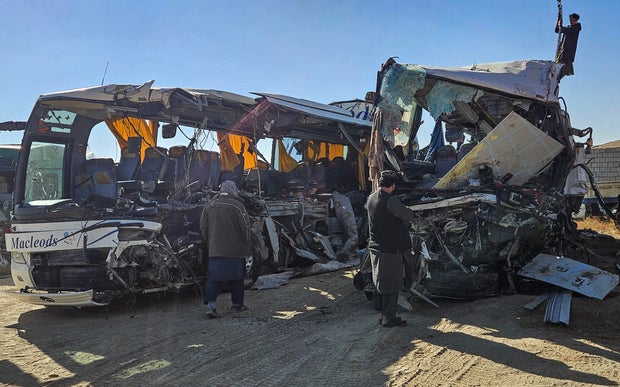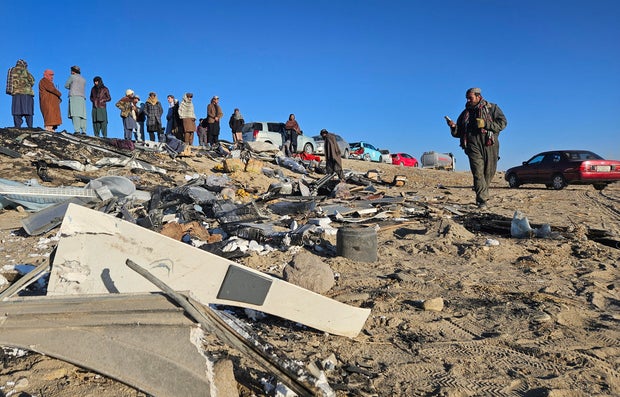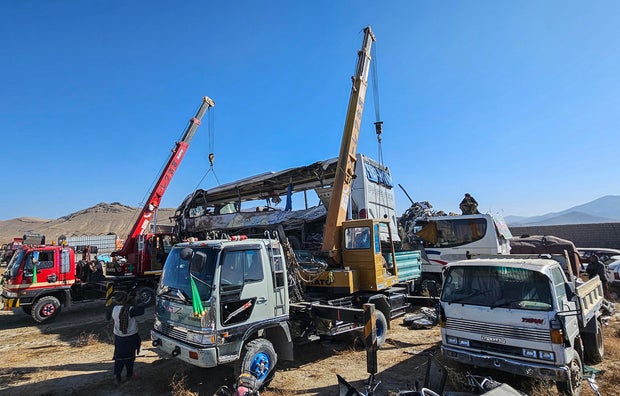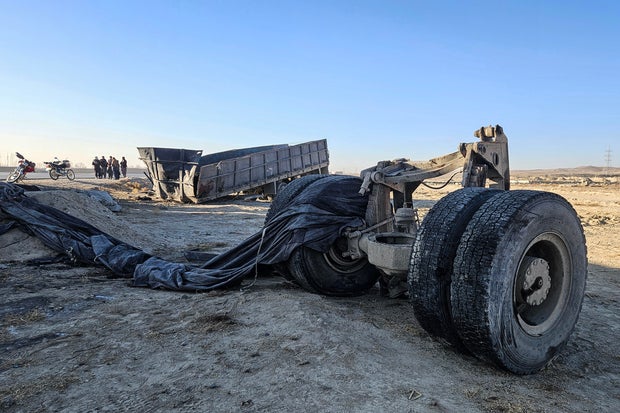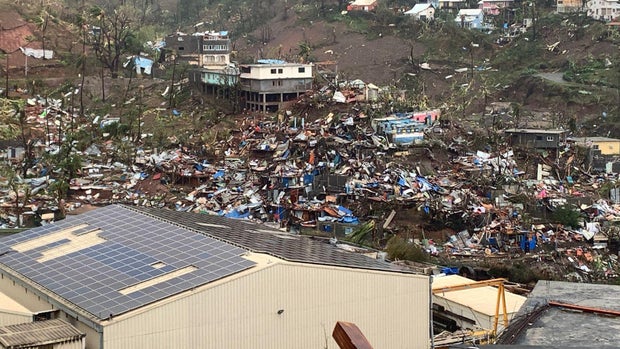CBS News
Supreme Court upholds law banning domestic abusers from having guns

Washington — The Supreme Court on Friday upheld a federal law that prohibits people who are subject to domestic-violence restraining orders from having firearms, ruling that the measure does not violate the Second Amendment.
The court ruled 8-1 that a person who has been found by a court to pose a credible threat to the physical safety of another may be temporarily disarmed consistent with the Second Amendment. Chief Justice John Roberts wrote the majority opinion. Justice Clarence Thomas was the lone dissenter.
“When a restraining order contains a finding that an individual poses a credible threat to the physical safety of an intimate partner, that individual may — consistent with the Second Amendment — be banned from possessing firearms while the order is in effect. Since the founding, our Nation’s firearm laws have included provisions preventing individuals who threaten physical harm to others from misusing firearms,” Roberts wrote. “As applied to the facts of this case, [the law] fits comfortably within this tradition.”
U.S. v. Rahimi
The case, known as U.S. v. Rahimi, was the first involving the Second Amendment heard by the court following its landmark June 2022 ruling that expanded gun rights and set out a new legal framework for determining when firearms restrictions are constitutional. The test requires the government to show that a challenged gun law fits with the nation’s history and tradition of firearms regulation. It can satisfy that standard by putting forth laws that are analogous to the modern-day measure under scrutiny.
In the wake of that ruling nearly two years ago, a number of long-standing gun laws have been challenged in federal courts and, in some instances, invalidated. But confusion and division among lower courts over how to apply the Supreme Court’s so-called history-and-tradition test led to calls for the justices to clarify it.
The legal battle involving the protections for victims of domestic violence presented the high court with the first opportunity to address that fallout.
The case involves a law enacted by Congress 30 years ago, which prohibits people under domestic-violence restraining orders from having guns. A Texas man, Zackey Rahimi, was subject to such an order granted to a former girlfriend when he threatened another woman with a firearm and fired guns in public on five different occasions in December 2020 and January 2021.
After those incidents, police executing a search warrant found two guns at Rahimi’s residence. He was indicted under the 1994 law and pleaded guilty, but challenged the constitutionality of the firearms prohibition as outside constitutional bounds.
The U.S. Court of Appeals for the 5th Circuit tossed out Rahimi’s conviction and invalidated the gun law after applying the Supreme Court’s history-and-tradition test. The appeals court said the historical analogues put forth by prosecutors “fall short,” and the prohibition for people under domestic-violence restraining orders “falls outside the class of firearm regulations countenanced by the Second Amendment.”
The justices heard arguments in the case in November. Conservative members of the court suggested that people found to be a danger to society could be disarmed and largely agreed that Rahimi, in particular, should not have access to weapons.
The impacts of the decision won’t be felt immediately, but could factor into challenges involving other gun laws that are moving through the lower courts or awaiting action from the justices.
One of those cases involves the constitutionality of a law disarming people convicted of nonviolent felonies, and a second concerns a law prohibiting a person who is an unlawful drug user from having guns. Hunter Biden, President Biden’s son, was found guilty by a Delaware jury of violating that law and two others related to his purchase and possession of a revolver in October 2018, while he was addicted to crack cocaine. The president’s son can pursue an appeal of his conviction that challenges the constitutionality of the federal prohibition on drug users.
CBS News
FAA bans drones over several New Jersey towns. See the list.

NEW YORK — Drones have been banned from flying over several New Jersey towns, the Federal Aviation Administration confirms to CBS News.
The FAA order covers nearly two dozen towns, including Jersey City, Harrison, Edison, Bayonne and Camden. It will be in effect until Jan. 17.
The order says no unmanned aircraft can operate below 400 feet within one nautical mile of the airspace specified in each area. Additionally, it allows the government to use “deadly force” against the drones if they pose an “imminent security threat.”
“Pilots of aircraft that do not adhere to the procedures in the national security requirements for aircraft operations contained in this section may be intercepted, and/or detained and interviewed by federal, state, or local law enforcement or other government personnel,” the order reads in part.
Several of the zones are centered around infrastructure, like power substations. Others cover areas like the Kearny, New Jersey port and airspace around military installations like Joint Base McGuire-Dix-Lakehurst in South Jersey, or airports such as Newark-Liberty International Airport.
Earlier this month, the Florham Park, New Jersey police chief told residents drone sightings had been reported above “water reservoirs, electric transmission lines, rail stations, police departments, and military installations.”
Where are drones banned in New Jersey?
North Jersey:
- Cedar Grove
- Bridgewater
- North Brunswick
- Metuchen
- South Brunswick
- Edison
- Branchburg
- Sewaren
- Jersey City
- Harrison, Essex County
- Elizabeth
- Bayonne
- Clifton
- Kearny
Central Jersey:
South Jersey:
- Burlington
- Evesham
- Camden
- Gloucester City
- Westampton
- Winslow
- Hancocks Bridge, Salem County
See the full order from the FAA here.
Mysterious drones over New Jersey and beyond
Drones sightings have been reported all month long, first over Morris County, New Jersey and then over several other East Coast states.
Federal, state and local officials have been demanding more information about where they are coming from and what’s being done to stop them. The FBI is leading the investigation and tells CBS News it has received thousands of tips.
While the White House says there is no known threat, New Jersey Gov. Phil Murphy recently sent a letter to President Joe Biden asking for more federal resources.
On Wednesday, a push from Sen. Chuck Schumer to give local law enforcement more ways to track drones was blocked in the Senate.
Check back soon for the latest updates on this developing story.
contributed to this report.
CBS News
2 bus crashes in Afghanistan leave dozens dead, dozens more hurt

Two highway crashes in southeastern Afghanistan killed a combined total of 50 people and injured 76, a government spokesman said Thursday.
One was a collision between a bus and an oil tanker on the Kabul-Kandahar highway late Wednesday, said Hafiz Omar, a spokesman for the governor of Ghazni province.
The other, also late Wednesday and in the same province, was in a different area of the same highway, which connects the Afghan capital with the south.
MOHAMMAD FAISAL NAWEED / AFP via Getty Images
Hamidullah Nisar, the provincial head of the Taliban-run Information and Culture Department, told the Reuters news agency the other accident involved a cargo truck, adding that some of those injured in both collisions were in critical condition.
Omar said many of the injured were taken to hospitals in Ghazni and patients in more serious condition were transferred to Kabul. Women and children were among the casualties, he said.
Authorities were in the process of handing over the bodies to families, Omar said.
MOHAMMAD FAISAL NAWEED / AFP via Getty Images
Crash survivor Abdullah Khan, who was being treated in a Ghazni hospital, said he didn’t know how many people had either died or were injured.
“I got out from the bus myself and heard the sound of moaning. There was blood everywhere. Some people had head injuries and others had hurt their legs.”
MOHAMMAD FAISAL NAWEED / AFP via Getty Images
Traffic accidents are common in Afghanistan, mainly due to poor road conditions and driver carelessness.
MOHAMMAD FAISAL NAWEED / AFP via Getty Images
CBS News
France’s President Emmanuel Macron tours cyclone-battered Mayotte, meets survivors pleading for help

Mamoudzou, Mayotte — France’s President Emmanuel Macron traveled Thursday to the Indian Ocean archipelago of Mayotte to survey the devastation that Cyclone Chido wrought across the French territory as thousands of people tried to cope without bare essentials such as water or electricity.
“Mayotte is demolished,” an airport security agent told Macron as soon as he stepped off the plane.
The security agent, Assane Haloi, said her family members, including small children, are without water or electricity and have nowhere to go after the strongest cyclone in nearly a century ripped through the French territory of Mayotte off the coast of Africa on Saturday.
KWEZI/AFP/Getty
“There’s no roof, there’s nothing. No water, no food, no electricity. We can’t even shelter, we are all wet with our children covering ourselves with whatever we have so that we can sleep,” she said, asking for emergency aid.
Macron got a helicopter tour of the damage and was to spend Thursday night on the far-flung French territory. After flying over the destruction, he headed to the hospital in Mamoudzou, Mayotte’s capital, to meet medical staff and patients.
Wearing a traditional Mayotte scarf on his white shirt and tie, sleeves rolled to the elbows, the French president listened to people asking for help. A member of the medical staff told him some people hadn’t had a drink of water for 48 hours.
Some residents also expressed agony at not knowing about those who have died or are still missing, partly because of the Muslim practice of burying the dead within 24 hours.
LUDOVIC MARIN/POOL/AFP/Getty
“We’re dealing with open-air mass graves,” Mayotte lawmaker Estelle Youssoufa told reporters. “There are no rescuers, no one has come to recover the buried bodies.”
Some survivors and aid groups have described hasty burials and the stench of bodies.
Macron acknowledged that many who died hadn’t been reported. He said phone services will be repaired “in the coming days” so that people can report their missing loved ones.
French authorities have said at least 31 people died and more than 1,500 people were injured, more than 200 critically. But it’s feared hundreds or even thousands of people have died in total.
Abdou Houmadou, 27, said emergency aid was needed immediately, not Macron’s presence.
“Mr. President, what I’d like to tell you… is I think the spending you made from Paris to Mayotte would have been better spent to help the people,” he said.
Another resident, Ahamadi Mohammed, said Macron’s visit “is a good thing because he’ll be able to see by himself the damage.”
“I think that we’ll then get significant aid to try and get the island back on its feet,” the 58-year-old said.
LUDOVIC MARIN/POOL/AFP/Getty
Macron’s office said four tons of food and medical aid, as well as additional rescuers, were aboard the president’s flight. A navy ship was due to arrive in Mayotte on Thursday with another 180 tons of aid and equipment, according to the French military.
People living in a large slum on the outskirts of Mamoudzou were some of the hardest hit by the cyclone. Many lost their houses, some lost friends.
Nassirou Hamidouni sheltered in his house when the cyclone hit.
His neighbor was killed when his house collapsed on him and his six children. Hamidouni and others dug through the rubble to reach them.
The 28-year-old father of five is now trying to rebuild his own house, which was also destroyed.
He believes the death toll is much higher than what’s officially being reported, given the severity of what he lived through.
“It was very hard,” he said.
Mayotte, located in the Indian Ocean between mainland Africa’s east coast and northern Madagascar, is France’s poorest territory.
The cyclone devastated entire neighborhoods and many people ignored the warnings, thinking the storm wouldn’t be so extreme.
Mayotte has more than 320,000 residents according to the French government. Most are Muslim and French authorities have estimated another 100,000 migrants live there.
Mayotte is the only part of the Comoros archipelago that voted to remain a part of France in a 1974 referendum.
Over the last decade, the French territory has seen a massive influx of migrants from the neighboring islands – the independent nation of Comoros, which is one of the world’s poorest countries.


